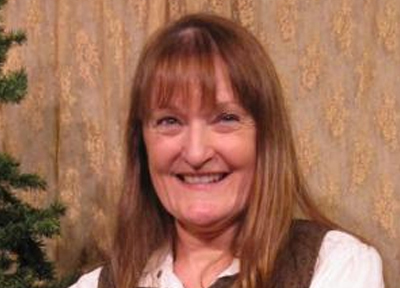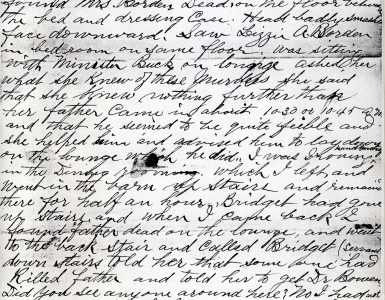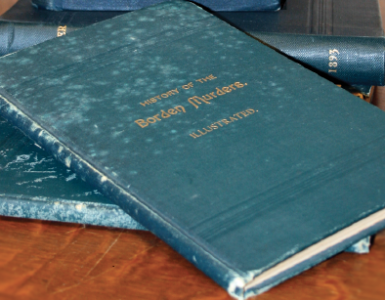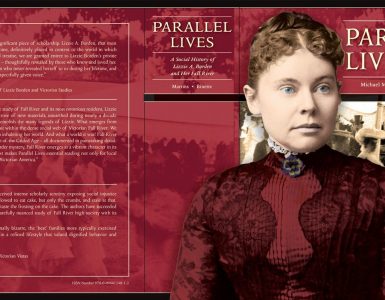By Gayle Stahlhuth
Artistic Director of East Lynne Theater Company, Cape May, NJ
First published in November/December, 2007, Volume 4, Issue 4, The Hatchet: Journal of Lizzie Borden Studies.
When the Equity professional not-for-profit East Lynne Theater Company (ELTC) was founded in 1980, it was one the first theatres in the country dedicated to studying and producing early American plays, as well as new works based on American history and literature. The title “East Lynne” is derived from a famous American play that was seen throughout the country during the last half of the 1800s. In 1996, due to the unique mission of the company, Ohio State University asked ELTC to house the company’s archives at its “Jerome Lawrence and Robert E. Lee Theatre Research Institute.”
In 1989, ELTC moved from The William Carlos Williams Center in Rutherford, NJ, to Cape May due to a request from members of The Mid-Atlantic Center for the Arts (MAC). This nonprofit organization was familiar with ELTC because it had brought three of ELTC’s touring shows to Cape May. After performing in several venues in Cape May, it appeared that the Cape May Institute would be ELTC’s continuing home, but a few years ago, this building was sold. Currently, the theater company is in residence at The First Presbyterian Church while looking for another permanent home.
When MAC asked ELTC to relocate, the town of Cape May was known for its Victorian architecture—the largest collection in the United States. With ELTC’s mission of early American theater, the staff at MAC believed that ELTC and the town would be a perfect fit. MAC maintains the historic Physick Estate and presents historic programs and trolley tours.
It appears to be a trend in many historic towns—that just being “historic” isn’t enough. In fact, phrases like “historic” and “Victorian” might even be turning off locals and tourists. I believe that attendance is down at historic sites in general, causing these places—including Cape May—to rethink marketing. Hence, you hear people call Cape May “Cool Cape May” and “Exit Zero” (it is literally Exit 0 on the Garden State Parkway), more than you hear “Victorian Cape May”—for the moment.
This rethinking of the town has made me rethink ELTC. Every year I try to produce something from the Victorian era, but since being asked to take over the company after the founder/AD Warren Kliewer passed away, I’ve been moving up the years, and still keeping within the mission. ELTC’s focus is actually becoming more 1920s.
I believe that people who really don’t grasp the idea that people are people no matter what time frame they are in say the “stuffy” adjective placed in front of “Victorian.” Fashion comes and goes, but people are people.
Which brings us to Lizzie Borden.
For five years, I’ve been looking for someone to write and/or perform a piece on this fascinating and provocative woman. New York actress Jill Dalton was the third person I asked, and happily, she agreed to do it. Of course, she has done much more research than me, but I had done enough to believe that Lizzie would be, and is, an excellent topic for a one-person show.
The only thing I asked of Jill was that she remain true to Lizzie in the play—Lizzie who maintained her innocence until she died. Jill had no problem with this, and probably would have figured this out on her own without my suggestion.
If Lizzie did commit the murders, and I tend to think she did, I believe she had good cause. What anger there must have been in her to keep holding on to that hatchet? I can’t imagine. And therein lies the legend. There were no self-help groups or hotlines for her to go to. She took as much as she could stand and literally took matters into her own hands. Although there are more places for women to seek help nowadays, many don’t, and they, too, snap. The year may be different, but people are the same.
As for the music used in Lizzie Borden Live, even before I read the first draft of Jill’s script, I’d talked to three-time Tony nominated Larry Hochman about writing it. I’d known him since the late 1970s, but we’ve never worked together. I knew the nursery rhyme “Lizzie Borden took an ax and gave her mother forty whacks…” could be used somehow in several places in various ways, and I assumed, correctly, that there would be sequences about the morphine, the trial, and the murder— that could merit original music. In fact, the original score could be considered the “other person” on stage with Lizzie/Jill.
There has always been a touring component to East Lynne Theater Company, and, aside from presenting Lizzie Borden Live for a five-week run in Cape May, it will also be placed on this roster. Already other theater companies and groups are asking for touring information about Lizzie Borden Live.
For information on the ELTC season, touring productions, artist-in-residence programs, and reservations, call 609-884-5898 or look online at www.eastlynnetheater.org.






